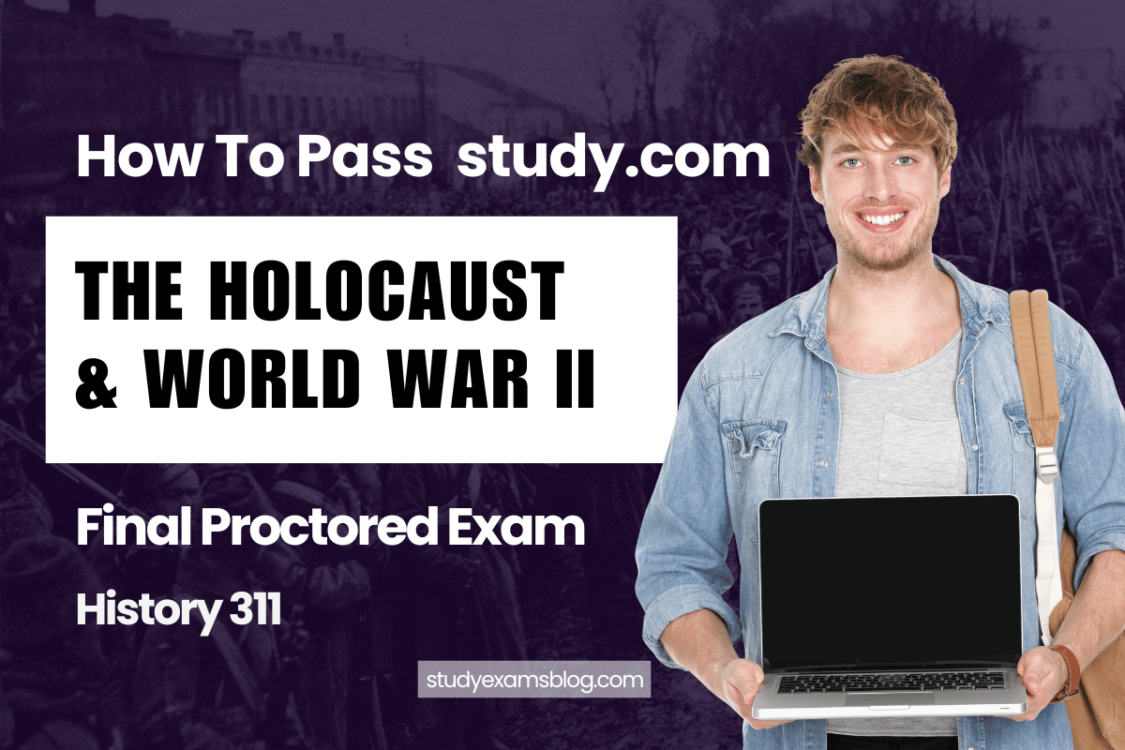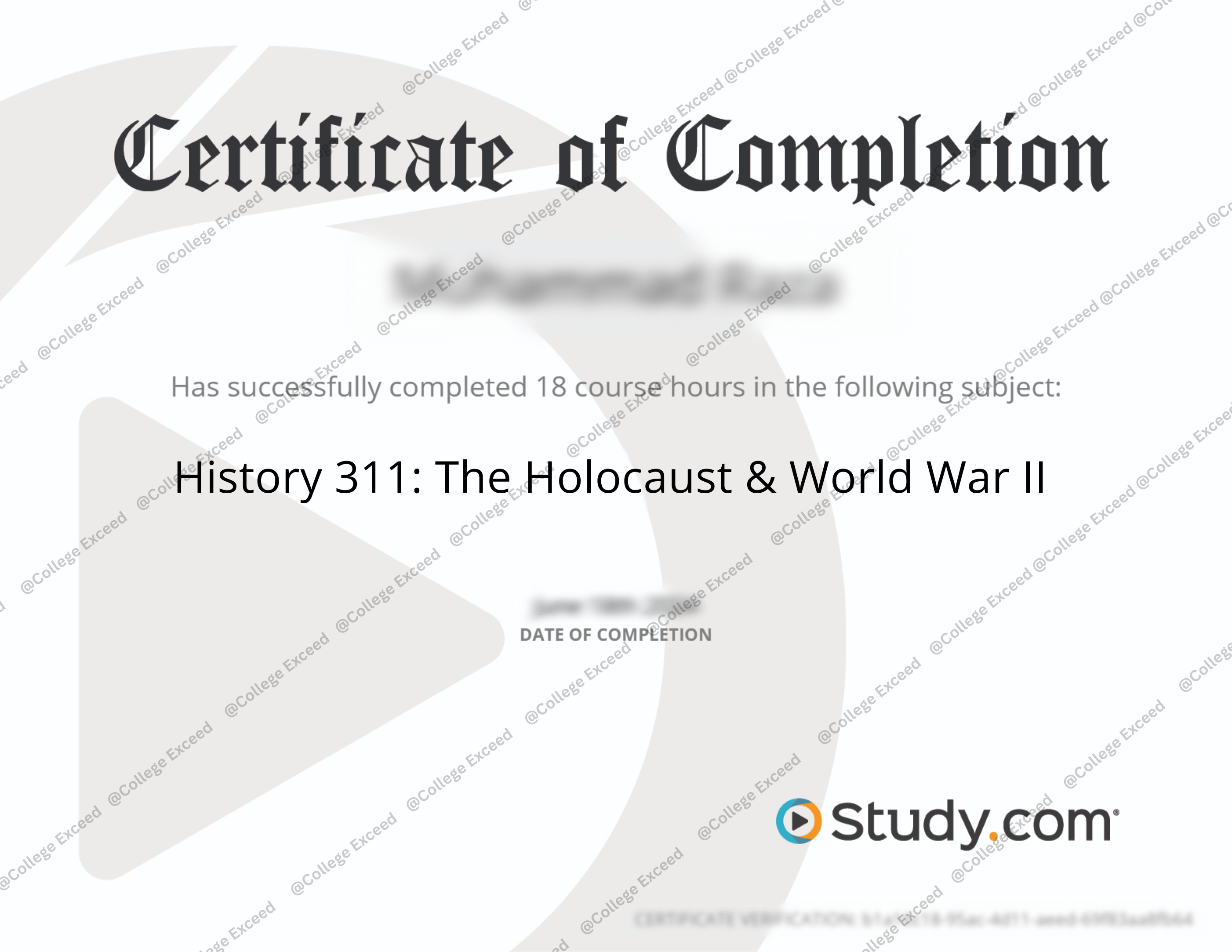
-
Gavin Walton
- October 23, 2024
In this article we will be plunging study.com History 311: The Holocaust & World War II! This course will guide you through one of the most history-defining times to understand how, when, and why antisemitism emerged, the Holocaust happened, and what came after World War II. If you want to get acquainted with these events in more detail and understand their importance for the world we live in today you are welcome.
Here, you will have a chance to discover major events and leaders of our history while analyzing the deep narratives behind the events that defined the lives of millions of people. The lessons go in the form of videos, quizzes, assignments, and assessment tests not only to teach the facts but also to teach critical thinking and moral analysis of historical events. When you finish this journey, you will more than appreciate how these historical events affect and are relevant to today’s culture and why it is important to keep the memory and learn of these events alive. Therefore, sit back and prepare for an enlightening journey in learning about Business Analytical Tools!
---

What to Expect from Study.com History 311 Class 📖
When approaching the study process, it is important to always remember that study is something that one goes through. In The Holocaust & World War II from the com History 311 history, you will get a lot of interesting information about the important period in history. Some of the topics which are covered in this course are the Beginning of antisemitism and persecution of Jews in Nazi Germany; the Nature of World War II; and the process of the concentration camps’ Liberation. It is for this reason I expect the show will be about the moral and ethical questions that occurred during this period of time as well as how various societies were built for hate and discrimination.
Throughout the course, you will meet fundamental concepts that have been considered in your exams. For example, a number of issues will be the adherence to the concept of justice during and after the Second World War – the topic of the Nuremberg Trials will become one of the focal points of the study as it contributed to forming the basis for international justice after the Holocaust. You will also approach the Final Solution and the practicalities of the Nazi’s genocide that are crucial to feed the magnitude of such occurrence. Also, presents and discusses the role of the resistance movements, which tell the story of the courageous people.
Regarding examinations, there will be tests after each lesson which will check how much the learner has understood in the lesson. The assignments will be in the form of submission and analysis of what you have learned in the class so that it brings about an understanding of the practical implications of the holocaust and the Second World War. It will be helpful to pay attention to topics that are frequent points of discussion throughout the course as these would most probably form the core of your exam questions. It will assist you to prepare adequately and pass the test as well as gain a better grasp of this significant historical background.
Week-by-Week Study Plan to Ace Study.com History 311 Exam📝
Now that you know what you are going to get into, let me give you a successful path that you can follow after this course. Organizing yourself well through a good study timetable can prove to be your best ally for this course. Below is a guide of topics of discussion for each week in consideration to cater for important information, reinforcement, and preparations for the final examination. Let’s dive in!
Week 1: Course Orientation and Key Concepts
- Objective: Familiarize yourself with the course layout, key concepts, and resources available on study.com.
- Activities:
- Watch introductory videos on the Holocaust and WWII.
- Read through the syllabus and assignment requirements.
- Begin making flashcards for key terms and figures.
- External Resource: Check out YouTube: Holocaust Overview for a brief introduction.
Week 2: Dive into Antisemitism and Early Persecution
- Objective: Understand the roots of antisemitism and the initial persecution of Jews.
- Activities:
- Complete lessons on antisemitism and the early laws enacted against Jews.
- Take quizzes to reinforce learning.
- External Resource: Refer to Quizlet: Antisemitism Flashcards for additional practice.
Week 3: The Holocaust and Nazi Policies
- Objective: Examine the policies leading to the Holocaust, including the Nuremberg Laws and the Final Solution.
- Activities:
- Watch lessons on Nazi policies and the implementation of the Final Solution.
- Write Assignment 1: Jewish Persecution Essay.
- External Resource: Explore History Channel: The Nuremberg Trials for further insights.
Week 4: World War II and Key Battles
- Objective: Learn about the major battles of WWII and their significance.
- Activities:
- Study lessons on key battles like Stalingrad and Normandy.
- Start a timeline of events covered in this week.
- External Resource: Use YouTube: World War II Battles for visual summaries.
Week 5: Resistance Movements
- Objective: Understand the various forms of resistance against Nazi oppression.
- Activities:
- Read about Jewish resistance movements and non-Jewish participation.
- Watch the lessons on the Warsaw Ghetto Uprising.
- External Resource: Check out Documentary: Resistance During the Holocaust for an in-depth look.
Week 6: Aftermath and Nuremberg Trials
- Objective: Analyze the Nuremberg Trials and their implications for justice.
- Activities:
- Complete lessons on the trials and their significance.
- Write Assignment 2: The Final Solution Essay.
- External Resource: Review YouTube: Nuremberg Trials Explained for context.
Week 7: Review and Practice
- Objective: Consolidate your knowledge and prepare for the proctored final exam.
- Activities:
- Revisit flashcards and quizzes.
- Take the practice exam on study.com.
- External Resource: Utilize Khan Academy: World War II Review for additional resources.
Week 8: Final Preparation
- Objective: Make final revisions and prepare for the proctored exam.
- Activities:
- Review all assignments, quizzes, and flashcards.
- Discuss key themes and concepts with classmates or in study groups.
- External Resource: Check YouTube: Study Tips for Final Exams for strategies to enhance your study routine.
---
Unlock Free Tools: The Best External Resources to Deepen Your Understanding📂
- YouTube Channels and Videos
The History Channel:
- Video: Auschwitz: Inside the Nazi State
- A comprehensive documentary exploring the infamous concentration camp.
Yad Vashem:
- Channel: Yad Vashem – The World Holocaust Remembrance Center
- Features survivor testimonies and educational content about the Holocaust.
BBC Documentary Series:
- Video: The Holocaust: A Learning Journey
- A series that provides insights into the Holocaust and its impact on history.
- Online Courses and Lectures
Coursera:
- Course: The Holocaust – A New History
- A free online course offering detailed lectures on the Holocaust from a historical perspective.
edX:
- Course: History of the Holocaust
- This course provides in-depth information and analysis of the Holocaust, focusing on key events and figures.
- Podcasts
The Holocaust Podcast:
- Link: The Holocaust Podcast
- Engaging in discussions about the Holocaust, its history, and its impact on society.
Witness from the BBC:
- Link: BBC Witness – The Holocaust
- A series of personal stories and interviews with Holocaust survivors.
- Other Resources
Yad Vashem Online Archive:
- Link: Yad Vashem Collections
- A vast collection of documents, photographs, and testimonies related to the Holocaust.
---
Key Topics to Focus On🔑
Before you get to the study.com History 311: The Holocaust & World War II final exam, you should be focused on the topics essential to your performance. Comprehension of these concepts assists in the final exams while at the same time giving insight into the importance of the holocaust and WWII. The four strategies have been outlined below in what can be considered as areas of focus.
- Antisemitism vs. Racial Ideology
Antisemitism | Racial Ideology |
|---|---|
Prejudice against Jews based on cultural, religious, or ethnic differences. | A belief system that categorizes people based on perceived racial superiority. |
Rooted in centuries of religious and social discrimination. | Central to Nazi ideology; Led to policies of extermination. |
Examples include blood libel and the Protocols of the Elders of Zion. | Fueled by pseudoscience and concepts like Lebensraum. |
Details: It is important to note the fact that antisemitism isn’t exclusive to the Nazis’ regime, however, it was used as a propaganda tool by them in order to ensure the implementation of their severe measures. Whereas, racial ideology gave them an intellectual reason and saw the Jews and other such groups as inferior. Knowledge of these differences will assist you in evaluating Nazi propaganda and the effects it had on the society.
- The Nuremberg Laws vs. The Final Solution
The Nuremberg Laws | The Final Solution |
|---|---|
Legal framework that stripped Jews of citizenship and rights. | Plan for the systematic extermination of the Jewish population. |
Enacted in 1935; served as a precursor to more severe actions. | Implemented primarily between 1941 and 1945 through camps and mass shootings. |
Established categories of Jewish identity (e.g., full Jews, Mischlinge). | Involved death camps like Auschwitz, Belzec, and Sobibor. |
Details: The Nuremberg Laws paved the way for legal persecution while the Final Solution to the Jewish Question was the ultimate of Nazi’s policies in which discrimination was taken to the next level as the Jews were eliminated. This means that it is possible to observe a transition from legal marginalization to mass extermination, which in itself is important for an understanding of the machinery of oppression.
- Forms of Resistance
Armed Resistance | Passive Resistance |
|---|---|
Organized armed uprisings (e.g., Warsaw Ghetto Uprising). | Spiritual and cultural preservation (e.g., keeping records, prayer groups). |
Partisan groups fought back against Nazi forces. | Acts of defiance such as hiding, sharing resources, and documenting experiences. |
Examples include the Bielski partisans and revolts in various ghettos. | Notable figures include Vittorio Sacerdoti, who saved Jewish lives through deception. |
Details: Armed resistance was often risky and resulted in dire consequences, yet it represented a fight for dignity and survival. Passive resistance, although less visible, played a crucial role in maintaining Jewish culture and spirit amidst despair. Both forms of resistance are essential to understand the complexity of Jewish responses to persecution.
- Impact of the Holocaust on Modern Genocides
Holocaust Influence | Post-Holocaust Genocides |
|---|---|
The Holocaust set a precedent for international human rights laws. | Events like the Rwandan Genocide and the ethnic cleansing in Yugoslavia occurred without effective intervention. |
Highlighted the need for organizations like the United Nations and the International Criminal Court. | Continued failure to prevent genocide despite the phrase “Never Again.” |
Led to the establishment of memorials and education programs about the Holocaust. | Historical lessons remain relevant in understanding modern conflicts and genocides. |
Details: The value of learning about the holocaust is exactly to avoid further such events, but the world does not seem to have gotten the message. Cognizance of this linkage can assist you come to terms with the need to maintain advocacy and awareness in avoiding the next genocide.
If you learn and master these major topics you will not only be prepared to pass this exam but also discuss the historical topics presented in this course.
---
Study.com History 311 FAQ❓
- How should I prepare for the proctored final exam?
Start by reviewing your course notes and completing all quizzes. Make use of the study guides provided on study.com. Form a study group with classmates, and consider taking practice exams to test your knowledge. Remember, you have three attempts for each quiz, so take advantage of that!
- What resources are recommended for additional study?
In addition to study.com materials, consider using external resources like YouTube documentaries on the Holocaust, historical podcasts, and flashcard sets on Quizlet. These can provide different perspectives and reinforce what you’ve learned.
- Are there specific assignments I need to focus on?
Yes, be sure to thoroughly understand the three assignments: the Jewish Persecution Essay, the Final Solution Essay, and the Primary Sources Essay. Each assignment will help deepen your understanding of critical concepts and is a good indication of what might be on the exam.
- How can I manage my study time effectively?
Create a study schedule that breaks down topics week by week. Allocate time for reading, quizzes, and writing assignments. Make sure to include time for breaks and self-care to prevent burnout!
- What if I struggle with certain concepts?
Don’t hesitate to reach out to your instructor or classmates for help. Additionally, use external resources for clarification. Websites like Khan Academy or educational YouTube channels can offer helpful explanations for difficult topics.
---
Final Thoughts: Wrapping Up Your Learning Experience📄
As you start your road map to the process of study.com History 311: The Holocaust & World War II, you should recall that it is pivotal to comprehend the material of this course for more than mere credit, it is pivotal to get what this historical period means. By immersing yourself in the topic, utilizing available resources, and following the study schedule you will not only gain more knowledge but also equip yourself, so that you may provide valuable input into ongoing/continuing discussions on this important topic.
Any concept of this course, from introducing the major concepts of antisemitism and resistance to exploring the details of the holocaust, is a chance to think about the past and the world of tomorrow. With effort, interest, and good approaches put in place, you are on the right track of passing this final exam and at the same time getting an understanding of this stage of history. So, dive in, keep your enthusiasm alive, and remember: That means with every study session you’re getting closer and closer to mastering the material!



